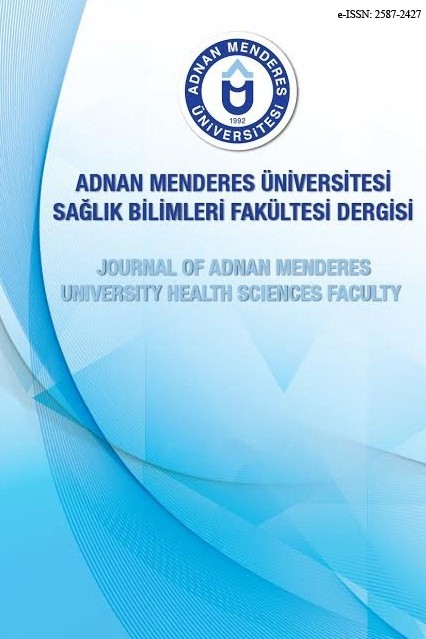Gebelerin Psikososyal Sağlık Durumları İle Annelik Rolü Algısı Arasındaki İlişki
Annelik rolü, Gebelik, Psikososyal sağlık
The Relationship Between Psychosocial Health Status of Pregnants and Perception of Maternal Role
Role of motherhood, Pregnancy, Psychosocial health,
___
- 1. Körükcü, Ö., Deliktaş, A., Aydın, R., & Kabukcuoğlu, K. (2017). Investigation of the relationship between the psychosocial health status and fear of childbirth in healthy pregnancies. Clin Exp Health Sci, 7(4), 152-158.
- 2. Özşahin, Z., Erdemoğlu, Ç., & Karakayalı, Ç. (2018). Psychosocial health level and related factors in pregnancy. The Journal of Turkish Family Physician, 9(2), 34-46.
- 3. Haakstad, A. H. L., Torset, B., & Kari, B. (2016). What is the effect of regular group exercise on maternal psychological outcomes and common pregnancy complaints? An assessor blinded RCT. Midwifery, 32(6), 81-6.
- 4. Boybay, K. S., & Dereli, Y. S. (2015). The effect of some socio-demographic and obstetric characteristics on the psychosocial health level of last trimester nulliparous pregnant women. Journal of Ege University Faculty of Nursing, 31(2), 53-66.
- 5. Daş, Z. (2016). Psychosocial and cultural dimension of pregnancy. Ed: Taşkın L. Obstetrics and gynecology nursing. 13. Printing. Ankara: Reaksiyon Matbaacılık; 218-30.
- 6. Yıldız, H. (2011). Study of development of pregnancy psychosocial health assessment scale. Maltepe University Nursing Science and Art Journal, 4, 64-71.
- 7. Özkan, S., & Serçekuş, P. (2017). Psychosocial aspect of being a mother. Ed: Kabukcuoğlu K. Psychosomatic reflections of women's health problems. 1. Printing. Ankara: Detay Yayıncılık.
- 8. Özkan, H., & Polat, S. (2011). Learning process of motherhood behavior and support of nursing. Bozok Medical Journal, (1), 35-39.
- 9. Karaçam, Z., & Ançel, G. (2009). Depression, anxiety and influecing factors in pregnancy: a study in Turkish population. Midwifery, 25(4), 344-56.
- 10. Çalışır, H. (2003). Investigation of factors affecting success of motherhood role of primipara women. (Unpublished Doctoral Thesis). Ege University Health Sciences Institute, Department of Pediatric Nursing, IZMİR.
- 11. Walker, L. O., Crain, H., & Thompson, E. (1986). Mothering behavior and maternal role attainment during the postpartum period. Nursing Research, 35, 352–55.
- 12. Seguin, L., St-Denis, M., & Loiselle, J. (1995). Cronic stressors, social support and depression during pregnancy. Obstetrics & Gynecology, 85, 583-88.
- 13. Affonso, D., Lovett, S., Arizmendi, T., Nussbown, & R., Newman, L. (1991). Predictors of depression symptoms during pregnancy and postpartum. Journal of Psychosomatic Obstetrics & Gynecology, 12, 255–71.
- 14. Gülseren, L. (1999). Postpartum depression: A review. Turkish Psychiatry Journal, 10, 58–67.
- 15. Gözüyeşil, E. (2003). Examination of depression in pregnant women and factors affecting this. (Unpublished Postgraduate Thesis). Ege University, Health Sciences Institute, Department of Nursing, IZMİR.
- 16. Büyükkoca, M. (2001). Examination of relationship between perceived social support and postpartum depression. (Unpublished Postgraduate Thesis). Dokuz Eylül University, Health Sciences Institute, Department of Nursing of Gynecology and Obstetrics, İZMİR.
- 17. Özkan, H. (2010). Effect of training regarding motherhood identity development on acquisition of motherhood role and infant perception of primiparas. (Unpublished Doctoral Dissertation). Atatürk University, Health Sciences Institute, Department of Department of Pediatric Nursing. ERZURUM.
- 18. Gager, C., McLanahan, S., & Glei, D. (2002). Preparing for parenthood: Who's ready, who's not? In N. Halfon, K. McLearn, & M. Schuster (Eds.), Child rearing in America: challenges facing parents with young children (pp. 50-80). Cambridge University Press.
- 19. Ossa, X., Bustos, L., & Fernandez, L. (2011). Prenatal attachment and associated factors during the third trimester of pregnancy in temuco. Chili Midwifery, 28, 689-96.
- 20. Collins, N. L., Schetter, D., Lobel, M., & Susan, C. M. (1993). Social support in pregnancy: Psychosocial correlates of birth outcome and postpartum depression. J Personal Soc Psychol, 65, 1243-58.
- 21. Okanlı, A., Tortumoğlu, G., & Kırpınar, İ. (2003). Relationship between social support perceived by pregnant women and their problem solving skills. Anatolian Psychiatry Journal, 4, 98-105.
- Yayın Aralığı: Yılda 3 Sayı
- Başlangıç: 2017
- Yayıncı: Aydın Adnan Menderes Üniversitesi
Hipertermik İntraperitoneal Kemoterapi Uygulaması: Çalışan Güvenliği
Nurcan BOYACIOĞLU, Sultan ÖZKAN
Hemşirelik Öğrencilerinin Sosyal Zeka Düzeyleri ve Etkili Bazı Değişkenler
Ali TAYHAN, Aynur ÇETİNKAYA, Çiğdem SABIKMA, Pınar BİNTEPE
Berna BAYIR, Fatma Nur YAĞIZ, Rabia ÇAT, Gülnur ÇAT
Yetişkin Seçici Yeme Ölçeği’nin Türkçe Uyarlamasının Geçerlilik ve Güvenilirlik Çalışması
Pınar HAMURCU, İrem Nur ŞAHİN, Abdullah ÇELİK
Ayla YAVUZ KARAMANOĞLU, Ali Ersin ZÜMRÜTBAŞ
Beslenmede Metilasyon Döngüsü Kavramı ve Hastalık İlişkileri
Zeyneb YILDIRIM, Hasan KÜÇÜKKENDİRCİ
Yeni Besin Deneme Korkusu: Obezite Gelişiminin Hem Nedeni Hem Sonucudur.
Adile BOZKURT, Ayşe İNEL MANAV, Esra ÜNAL
